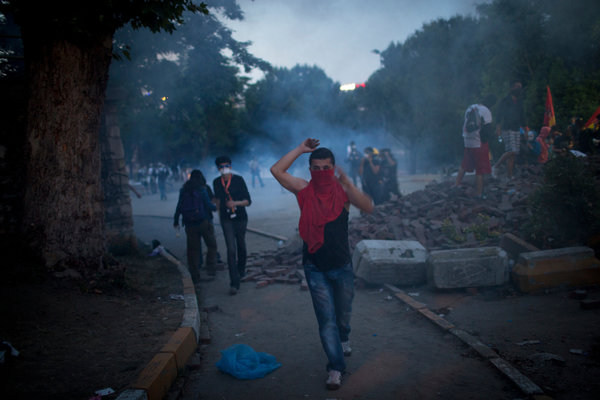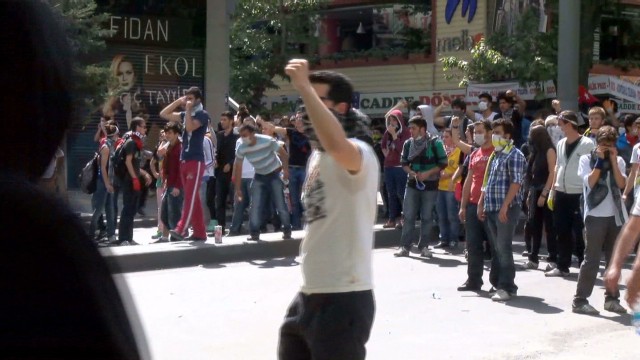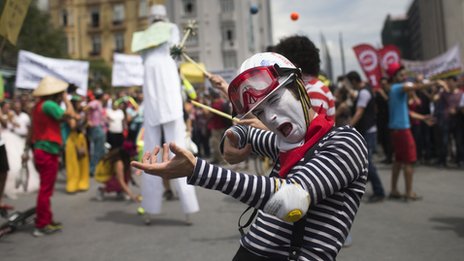Throughout the recent upheaval, Mr. Erdogan’s behavior has given new fuel to already-simmering questions about his aims and methods — whether he has turned more autocrat than democrat, or at the least whether a deft politician has fallen into overconfidence. Mr. Erdogan’s political rise has been widely seen as the catalyst for a new era of Turkish influence and prosperity, and he has cast his government as a democratic model for nations with Muslim populations rising up against dictators. Domestically, he has the security of a strong power base among Turkish religious conservatives — a majority of the electorate — who were marginalized by the military and the country’s old secular elite. He alluded to that support on Monday, as protests continued across Turkey’s major cities. He said he could “hardly contain” his constituents from leaving their homes to mount a counterprotest on his behalf. “Be calm, this will all pass,” he added.
But for his opponents, his harsh dismissal of the protesters gathering in Istanbul and Ankara as “bums,” and in particular his allowing the police to crack down on what began as a peaceful demonstration against the razing of a park in Taksim Square, is public evidence of a longer slide into authoritarianism. They cite years of intensifying crackdowns on dissent and the news media, and purges of the military officer corps. “He has a highly majoritarian understanding of democracy,” said Ilter Turan, a political scientist at Bilgi University in Istanbul. “He believes that with 51 percent of the vote he can rule in an unrestrained fashion. He doesn’t want checks and balances.” And after 10 years of Mr. Erdogan (pronounced AIR-doh-wan), a former Islamist activist, many liberal or secular Turks have expressed weariness over what they see as his attempts to impose on their private lives: what Cengiz Candar, a popular columnist, described Monday as his “conceit and arrogance.”

Demonstrators ran from tear gas fired by the police during a clash in Istanbul on Monday. Prime Minister Recep Tayyip Erdogan is facing a political crisis.
He has sought to restrict alcohol, has repeatedly held that women should have at least three children and sometimes seems drawn to peculiar topics for pontification: this year, for example, he declared that the “era of white bread is over,” and that Turks should go whole grain. There is an added sting for many who have supported Mr. Erdogan. In his speeches, he has been an eloquent defender of inclusiveness and human rights — statements that added to his political draw among Turks who might otherwise have been put off by his Islamist past. Increasingly, however, his actions have seemed at odds with his words. Mr. Erdogan has been lionized for serving jail time for reciting a poem with religious overtones in public while he was Istanbul’s mayor. And in an interview last year with The Istanbul Review, a literary journal, he said: “Censorship is an unacceptable method of obstruction, not only in literature but in all arts, media, politics and many other fields. The freedom of expression is a right that we work to solidify every day and a subject we are particularly sensitive about.”
But in the years since he became prime minister, his government has become a leading jailer of journalists and opposition writers. And over the weekend, he was particularly vocal about protesters’ use of social media, singling out Twitter as a “menace” used to disseminate lies. Mr. Erdogan, 59, grew up in a pious, low-income neighborhood in Istanbul when Turkey was ruled by an elite that heavy-handedly banished religious expression from public life. In rising to power, he took that once-peripheral social class to the center of Turkish public life. And analysts say it will be that constituency’s reaction that determines how he weathers the current crisis. For now, it seems to be standing solidly behind him.
MORE













